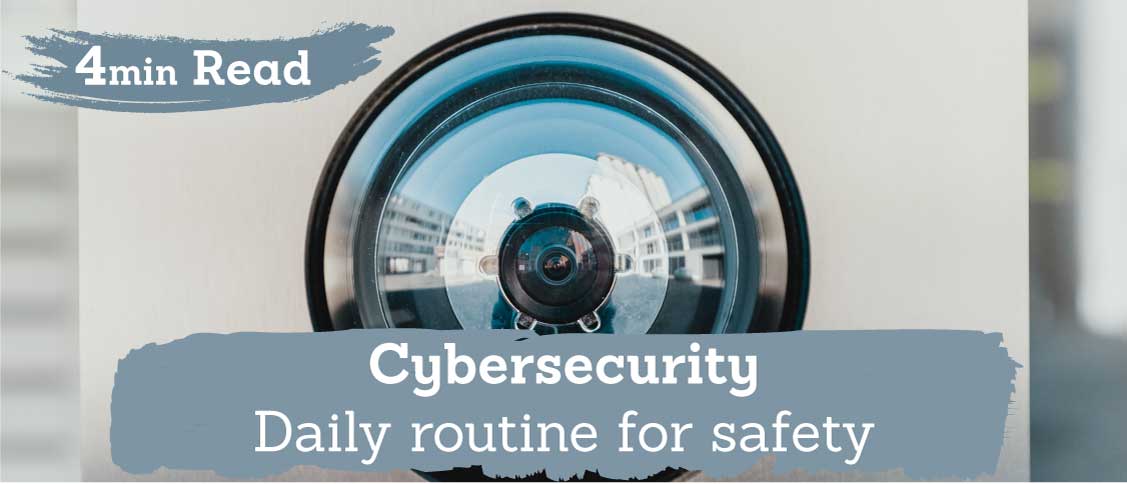Daily routine for company cybersecurity

Published:
Keeping the cybersecurity level high in a company can be pretty damn hard. Whether we’d like to admit it or not, many people simply don’t understand the concept of virus intrusions and malware attacks – I mean does anyone really know?
Cybersecurity is a vital part of any business and should it fail, the company could tank as well. But how can everyone in the company support your cybersecurity measures on a daily basis?
Necessary Cyber Security Measures
Talk to each other
The most direct way to raise awareness of cybersecurity issues and threats is through talking to your employees. Depending on the severity of online attacks your business is prone to you should plan a chat with your team at least once a month.
All it takes is for one employee to buckle under pressure and click the wrong link online, opening you to a world of cybersecurity pain. Try and stay on top of trending threats and viruses through security newsletters. Most popular ransomware and malware threats can be completely avoided if people simply know what type of attack to expect. It’s good to work together on this, by sharing your experiences with your business community. Hashtag that threat!
Up-to-date software
It’s an obvious one, but whether it’s High Sierra Alps XX or Windows 5 billion, software updates pretty much install themselves nowadays, so everyone needs to keep up to date with their computer’s operating systems. A system operating at the peak of its condition will be able to properly deal with smaller pesky infections.
However, companies that are using older systems and software should emphasise the importance of updating antivirus software, browsers as well as apps. This can prevent threats that target old school backdoor vulnerabilities.
Local and cloud backups
Cloud back-ups are the holy grail of system failures, should everything go South, your documents are all kept safe online. A good tactic to start today, if you haven’t already, is to designate folders to each team so that everyone can pop their work on to be accessed anywhere. If that’s not for you, make sure you’re backing up onto your local drive at least once a week. Employees can contribute to this by flagging any files that were modified since the last backup.
It’s worth noting that Signable stores all documents sent and signed using a cloud server, meaning you’ll never lose anything that’s sent using them. In fact, every action taken towards the uploaded document is logged and available for review, meaning that no one can modify the file without the consent of the uploader. This type of security can prove vital for clients that are debating whether or not to use Signable for their cloud upload needs. Safety is pretty cool.
Password security
Company passwords should be updated often, sometimes even twice a month. Keeping your internal passwords in rotation is a smart move if you consider the type of attacks you want to prevent. Cybersecurity is often more than just about passwords, but changing them can help you avoid almost all offline attacks.
Signable’s most notable feature is the security it provides for its clients. The database is designed with a one-way encryption method that ensures the protection of any data that clients present for safekeeping. Online cybersecurity is equally important for everyone, whether you are a content creator in a writing service or the head of appraisal in a financial corporation. Only you and the IT department should have access to your password.
Limited external drive use
Many cybersecurity issues stem from a simple misunderstanding from your employees’ perspective. No one wants to fill their weekend with work, but it’s good to know how to access work home without using infected external storage.
Cloud computing and online storage platforms have advanced enough to allow for a cheap and effective service to be implemented company-wide. Investing in team cloud storage such as Google Drive or Dropbox allows for a safer, faster and more reliable way of sharing data than flimsy USB sticks.
Using ad blockers
No matter what internet browser your staff is using, there is always the looming threat of ads to worry about. We’ve all seen them, we all know not to click them. However tempting. Keep in mind that these ads are filled with malware and spyware more often than not.
Implore your staff not to follow up on these ads and ensure that your IT department has placed ad blockers on each computer. The most popular ad-blocking software extension is present in Google Chrome by the simple name of Ad Blocker.
Daily and weekly malware sweeps
Lastly, your IT department should be in charge of sweeping the network of any malware or cybersecurity threats. These sweeps should be done on a strict schedule, sometimes even on a daily basis depending on the severity of internet use in your company. This prevention method is a great way to eliminate any dormant and accidental cybersecurity breaches that might have gone unnoticed.
Leaving malware to lay dormant until activated by accident can cause you a lot of time and money. Invest in a reliable antivirus and malware protection but above all – make sure to use it often and in a smart way.
Security means reliability
The way you treat your important information will speak volumes about how you treat clients and partners. Both your employees and outside stakeholders will be impressed by the effort you took to make sure that your cybersecurity measures are up to the challenge.
Don’t be afraid of implementing a daily routine that can ensure the safety of your confidential files and servers. All it takes is one big hit to your cybersecurity to leave your company staggering for months.
Author bio: James Scott is a marketer and CEO at Essay Supply. He is passionate about the security of marketing and strives to deliver the best service. Connect with him on LinkedIn!